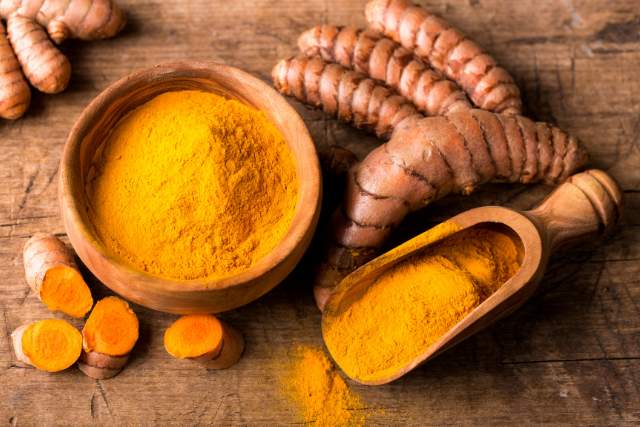Recent Posts
-

- Diabetes-Friendly Nutrition: Smart... 08.12.2024
-

- Nutrition for Chronic... 08.12.2024
-

- Anti-Inflammatory Diet: Food... 08.12.2024
-

- Low-Sodium and Heart-Healthy:... 08.12.2024
-

- Plant-Based Diets for... 08.12.2024
Exploring the Culinary and Medicinal Uses of Turmeric: The Golden Spice

Turmeric, sometimes referred to as "The Golden Spice," has been lauded for a long time because it has a distinctive taste, a brilliant color, and several health advantages. Since ancient times, this spice, produced from the Curcuma longa plant, has been an essential component in both traditional culinary preparations and medical treatments. Turmeric is a versatile spice that may be used for a wide range of purposes, from enhancing the flavor of curries to acting as a powerful natural medicine. Let us introduce you to this wonderful spice's culinary and medical benefits.
Both traditional Chinese medicine and traditional Indian Ayurvedic medicine have made use of turmeric for thousands of years. It has been used for that purpose since ancient times when it was revered as a holy plant and cherished for its medical powers. In the past, turmeric was extensively used to treat many diseases, including digestive problems, inflammation, and skin concerns. With time, turmeric's culinary applications evolved, and it eventually became a celebrated spice in cuisines all over the globe.
Delights in the Kitchen
Turmeric is highly prized in the culinary world because it has a toasty, earthy taste and a beautiful golden hue. It is an essential component in a wide variety of savory foods, notably those prepared in India, Southeast Asia, and the Middle East cuisines. Curry, rice dishes, soups, stews, and marinades are just a few cuisines that include turmeric as a flavoring ingredient. Dishes are given more depth and complexity by their slight bitterness and peppery overtones, while their golden tint enhances their visual appeal.
Advantages to One's Health
Because curcumin is the active component of turmeric, it is well-recognized for its powerful therapeutic benefits. Curcumin is a potent antioxidant and anti-inflammatory chemical that has been the subject of considerable research investigations due to its possible health advantages. According to research, curcumin may help decrease inflammation, relieve pain, and protect against chronic illnesses such as Alzheimer's, cancer, and heart disease.
Properties that are both anti-inflammatory and antioxidant
One of the health advantages of turmeric that has received the most attention from researchers is its ability to reduce inflammation. Numerous illnesses, including arthritis, heart disease, and cancer, are thought to be caused by chronic inflammation, which is considered to play a fundamental role in the development of these diseases. There is evidence that curcumin may block inflammatory pathways in the body, which can reduce inflammation and provide treatment for illnesses that are characterized by inflammation.
In addition, turmeric is a powerful antioxidant that helps protect cells from oxidative damage and neutralizes potentially hazardous free radicals. The use of antioxidants is crucial for the preservation of general health and the reduction of the risk of chronic illnesses that are related to oxidative stress.
Digestive Health
As a digestive aid, turmeric has been used for a very long time in several traditional medical systems. It is said to increase the formation of bile, which assists in the digestion of fats and helps reduce symptoms of indigestion and bloating. Therefore, it is considered to be beneficial. In addition, turmeric has the potential to alleviate discomfort in the gastrointestinal system and decrease inflammation in patients suffering from illnesses such as irritable bowel syndrome (IBS) and inflammatory bowel disease (IBD).
Incorporating Turmeric into Your Diet
Including turmeric in your diet is not only simple but also delicious. Either raw turmeric root or powdered turmeric powder may be used to provide taste to a broad range of different recipes. A burst of flavor and increased health benefits may be achieved by using turmeric in foods such as soups, stews, rice dishes, roasted vegetables, and smoothies.
To make turmeric tea, you may also soak fresh or powdered turmeric in hot water and then add honey or lemon to taste for sweetness and acidity. This method can be used to make turmeric tea.
Additionally, turmeric is a golden treasure mine of culinary treats and therapeutic miracles. In conclusion, turmeric is much more than simply a spice. Turmeric has earned its position as a mainstay in kitchens and medicine cabinets all over the globe, whether it is used to enhance the taste of savory meals or to take advantage of the powerful health advantages it offers.
Therefore, the next time you grab this golden spice, keep in mind that you are not only titillating your taste senses, but you are also feeding your body and spirit with the variety of culinary and medical benefits that it has.
Disclaimer: The information provided in this article is for general information purposes only. All information in this article is sourced from other websites, and we do not represent any rights regarding the contents and information on the site. All rights belong to their original owner.





